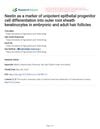Search
for
Did you mean Epithelial Differentiation?
Learn
5 / 6 resultslearn Osteopontin
signaling protein that, when suppressed, may grow hair by reducing inflammation and stem cell loss
learn Epidermal Growth Factor
learn Overview
learn Hair Multiplication
extract, clone, and reinsert your own hair cells
Research
5 / 1000+ results
research Hairless and Wnt Signaling: Allies in Epithelial Stem Cell Differentiation
The HR protein's role as a repressor is essential for controlling hair growth.

research Nestin as a Marker of Unipotent Epithelial Progenitor Cell Differentiation into Outer Root Sheath Keratinocytes in Embryonic and Adult Hair Follicles
Nestin marks cells that can become a specific type of skin cell in hair follicles of both developing and adult mice.

research Characterization of Cell Cycle Arrest and Terminal Differentiation in a Maximally Proliferative Human Epithelial Tissue: Lessons from the Human Hair Follicle Matrix
CIP/KIP proteins help stop cell division and support hair growth.
research Multifaceted Role of Keratins in Epithelial Cell Differentiation and Transformation

research The Transcriptional Repressor CDP (Cutl1) Is Essential for Epithelial Cell Differentiation of the Lung and the Hair Follicle
CDP is crucial for lung and hair follicle cell development.
Community Join
5 / 36 results
community Compressed part of research of theory of androgenic/anabolitic balance. AGA h-responders analytic. Theory of physio-metabolitic method of anti AGA treatment
The treatment for androgenetic alopecia involves using finasteride and minoxidil with intense exercise and cold exposure to boost metabolism and reduce androgenic effects, potentially leading to hair regrowth. This approach may activate biological pathways for improved hair and overall health.

community Minoxidil Response Bottlenecks: Why Sulfation and Transport Matter (And Where Tretinoin Fits In)
Minoxidil's effectiveness is limited by the need for sulfation and proper transport to hair follicles, with tretinoin potentially enhancing its effects by promoting enzyme activity and keratinocyte differentiation. Tretinoin may improve minoxidil's response by boosting the expression of necessary enzymes and transporters.
community TWIST-1 and the cure: Is it really that easy?
TWIST-1 gene's role in hair loss and potential as a treatment target. Inhibiting TWIST-1 may prolong hair growth and reduce hair follicle sensitivity to DHT.
community HairClone developing cell replacement treatments for Hair Loss
HairClone is developing cell replacement treatments to rejuvenate and generate hair follicles, and has launched a crowdfunding campaign. A user expressed skepticism about the need for crowdfunding.
community abusing caffeine boosts DHT levels!
Caffeine intake may increase DHT levels, but its impact on hair loss is minimal compared to genetic factors. Excessive caffeine can cause health issues, and its effects on hair loss are not directly applicable to humans based on rat studies.